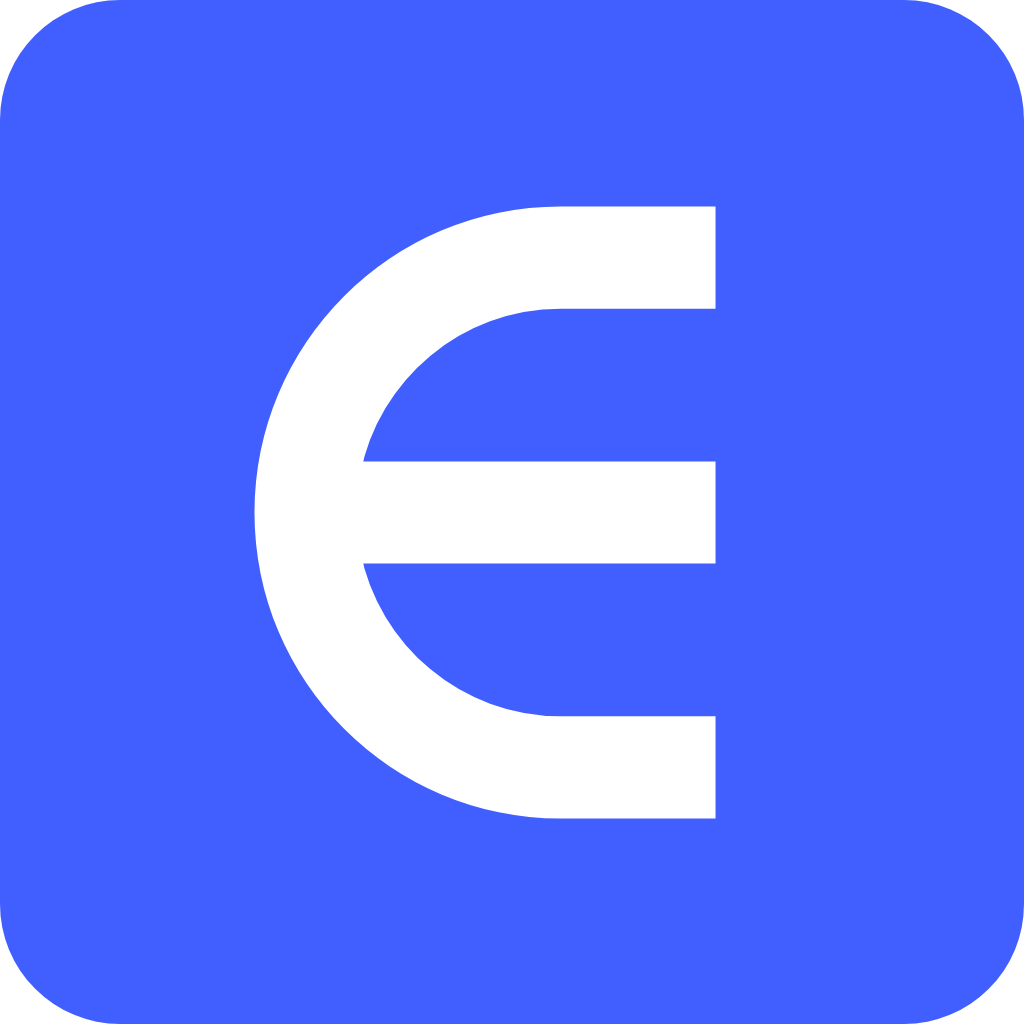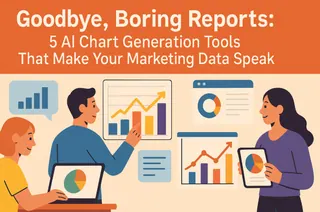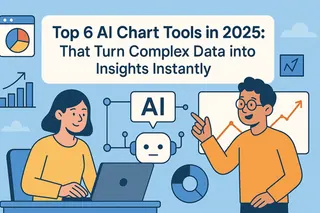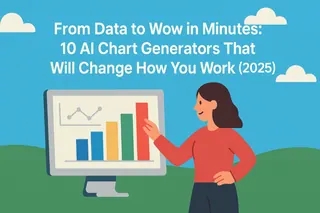Key takeaways:
- AI pie chart generators automatically transform numerical data into clear proportional visuals, eliminating the tedious manual work of calculating percentages and designing charts to show market share, budget breakdowns, or sales contributions.
- These tools use AI to understand part-to-whole relationships in your data, automatically generating clearly labeled pie charts that highlight the most significant contributors and provide instant clarity for any audience.
- By simplifying the creation of proportional visuals, these AI tools empower users to transform complex numbers into a simple, persuasive narrative, making it easier to tell a compelling data story and drive alignment with stakeholders.
The Ultimate Guide to AI Pie Chart Generators
Data without a clear picture often gets ignored. Imagine you're in a sales meeting, trying to explain which region contributed the biggest slice of this quarter's revenue. If your numbers stay trapped in a spreadsheet, your audience will tune out. That’s where pie charts come in. They’re simple, instantly understandable, and perfect for showing proportions. But here’s the problem: making a clean, accurate pie chart can still take far too much time.
The good news? You don’t need to wrestle with Excel formulas or complex design tools anymore. AI pie chart generators are here to do the heavy lifting, turning your raw data into insightful visuals that tell a clear story. Below, we'll walk you through everything you need to know about these smart tools and help you choose the perfect one.
What are AI pie chart generators?
AI pie chart generators are software tools that use artificial intelligence to automate the creation of pie charts. Unlike traditional methods, where you manually select data, wrestle with chart wizards, and painstakingly adjust labels, AI tools streamline the entire process. They can interpret plain-language commands (like "show me sales by product category"), connect to your data, and automatically generate a polished chart that clearly shows proportions. They help you instantly see the big picture.
What to consider when choosing an AI pie chart tool
Adopting a new tool is an investment, but the right one pays for itself almost immediately by making your reports clearer and more persuasive. Before you choose, consider these four factors:
- Data Integration: Can the tool easily connect to your existing data sources, like Excel files, Google Sheets, or a live database? The less manual data entry, the better.
- Ease of Use: A powerful tool is useless if it's too complicated. Look for an intuitive interface that allows your entire team to create charts without needing extensive training.
- Customization and Flexibility: Your charts should look professional and on-brand. Choose a tool that offers enough options to modify colors, fonts, and labels to match your company's style.
- Security and Compliance: Sales and business data is sensitive. Ensure the tool you choose has robust security features, like user access controls and data encryption, to keep your information safe.
5 AI Pie Chart Generators to Visualize Proportions Instantly
- Excelmatic
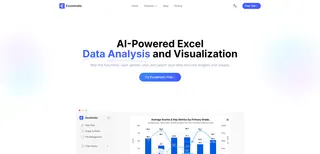
For anyone whose professional life revolves around spreadsheets, Excelmatic is the AI co-pilot you've been waiting for. It’s designed to eliminate the most tedious parts of data visualization—calculating percentages, formatting charts, and wrestling with pivot tables. Instead of clicking through endless menus, you simply tell it what you need in plain English, and it transforms your raw, messy data into a clean, presentation-ready pie chart instantly.
Key Features:
- AI-Powered Chart Generation: Simply upload your file or type a request like "make a pie chart of sales by region with percentages," and the tool builds it for you.
- Automated Insights: Goes beyond visuals by automatically generating a text summary that explains the key takeaways and the story behind your chart's proportions.
- Seamless Spreadsheet Integration: Works directly and securely with the tools you already use every day—Excel and Google Sheets.
- Multi-Chart Versatility: Instantly create not just pie charts, but also bar, line, and donut charts to find the perfect visual for your data.
- One-Click Export & Sharing: Easily download high-quality chart images for your reports and presentations, or share a live link with your team.
2. Graphy
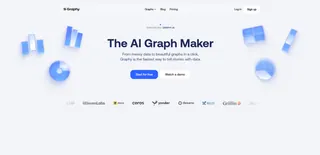
Graphy is designed for data storytelling, helping you create polished, branded reports where visuals and narrative work together. It’s less about one-off charts and more about building a compelling case for your audience. Use it to transform a simple spreadsheet into a beautiful, multi-page story with AI-generated text and visuals that explain the "so what" behind your numbers.
Key Features:
- AI-Generated Narratives: Automatically creates text summaries and insights to accompany your pie charts.
- Branded Storytelling Decks: Customize visuals with your company’s logo, fonts, and colors for a professional look.
- Presentation & Report Templates: Start with pre-built templates designed for effective data storytelling.
- Collaborative Workspace: Work with your team to build and refine data-driven reports in real time.
3. LiveChatAI
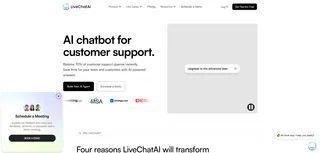
Your customer conversations are a goldmine of data, but it's often unstructured. LiveChatAI is a specialized tool that transforms qualitative data from chat logs or support tickets into clear pie charts. It’s perfect for support managers and product teams who need to instantly visualize the breakdown of customer issues, feedback sources, or satisfaction scores without manual categorization.
Key Features:
- Text-to-Chart Conversion: Automatically analyzes conversation data and visualizes it as a pie chart.
- Real-Time Insight Tracking: Ideal for monitoring the composition of support tickets or customer feedback as it happens.
- Dashboard Integration: Embed live pie charts directly into your customer support dashboards.
- Topic & Sentiment Analysis: Go beyond simple keywords to understand the underlying themes in customer interactions.
4. NoteGPT
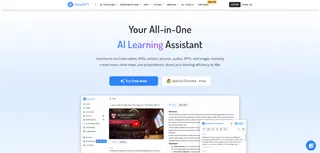
NoteGPT excels in the world of pure productivity, acting as a bridge between your text notes and quick data visuals. It's the perfect tool for when you've just finished a meeting, polled your team, or summarized survey responses and need to instantly visualize the results. Simply paste text like “40% voted for Option A, 60% for Option B,” and NoteGPT generates the corresponding pie chart.
Key Features:
- Instant Text-to-Pie Chart: Creates pie charts directly from unstructured text or summary points.
- Productivity Workflow Focus: Designed for researchers, students, and managers who need to visualize findings on the fly.
- Quick Summary Visuals: Perfect for turning poll results, survey answers, or meeting decisions into an easy-to-understand chart.
- Simple & Fast: No complex settings; just paste your text and get your visual.
5. Edraw.AI

For the visual thinker who believes a chart is just the beginning, Edraw.AI offers a vast canvas. It’s a powerful AI-assisted diagramming tool with a massive template library for everything from pie charts to intricate flowcharts and mind maps. It's ideal for students and professionals who need to place their data within a larger visual context for presentations or academic projects.
Key Features:
- Versatile AI Diagramming: Generate not just pie charts, but a wide array of other business and technical visuals.
- Massive Template Library: Get a head start with thousands of professionally designed templates.
- Drag-and-Drop Editor: Enjoy full creative control to customize every aspect of your chart and diagram.
- Design-First Approach: Balances data visualization with powerful graphic design capabilities.
Master Your Data Storytelling with Excelmatic

Stop struggling to get the percentages right in your spreadsheet and start creating perfect pie charts in seconds with Excelmatic. It’s an AI co-pilot designed for anyone who lives in Excel or Google Sheets, eliminating tedious manual work so you can focus on what the data actually means. It doesn’t just draw circles—it tells the story behind them.
Key features:
- AI Pie Chart Builder: Simply upload your spreadsheet or type "make a pie chart of sales by region with percentages," and watch the magic happen.
- Automated Insights: Excelmatic doesn't just give you a chart; it generates a clear text summary explaining what the proportions mean.
- Seamless Spreadsheet Integration: Works directly with the tools you already use every day—Excel and Google Sheets.
- Multi-Chart Versatility: Instantly create bar, line, donut, or pie charts to find the best way to tell your story.
- Full Customization & Branding: Easily adjust colors, fonts, and labels to align with your brand for a professional look.
- One-Click Export & Sharing: Download your chart as a high-quality image or share a live link for reports, slides, or team updates.
Start your free trial today and discover the fastest way to turn your spreadsheet data into a clear visual story. For enterprise solutions, dedicated support, or custom integrations, contact our sales team.
AI Pie Chart Generator FAQs
Which AI pie chart tool is right for me?
Your best choice depends on your specific goal:
- If you want the fastest, spreadsheet-friendly tool → Excelmatic is your best bet.
- If you need full storytelling decks → Go with Graphy.
- If you work in customer support and need to analyze chat data → LiveChatAI will shine.
- If you want to quickly visualize meeting notes or polls → Try NoteGPT.
- If you need a design-first tool with lots of templates → Edraw.AI is ideal.
What are AI pie chart generators?
They are smart tools that use artificial intelligence to automatically create pie charts. Unlike traditional software, they understand plain language, calculate percentages for you, and generate polished visuals in seconds, saving you significant time and effort.
What are the main benefits of using these tools?
The primary benefits are speed and clarity. They automate repetitive design work, reduce human error, and help you create professional-looking charts that make your data easy to understand. This leads to faster decision-making and more persuasive presentations.
